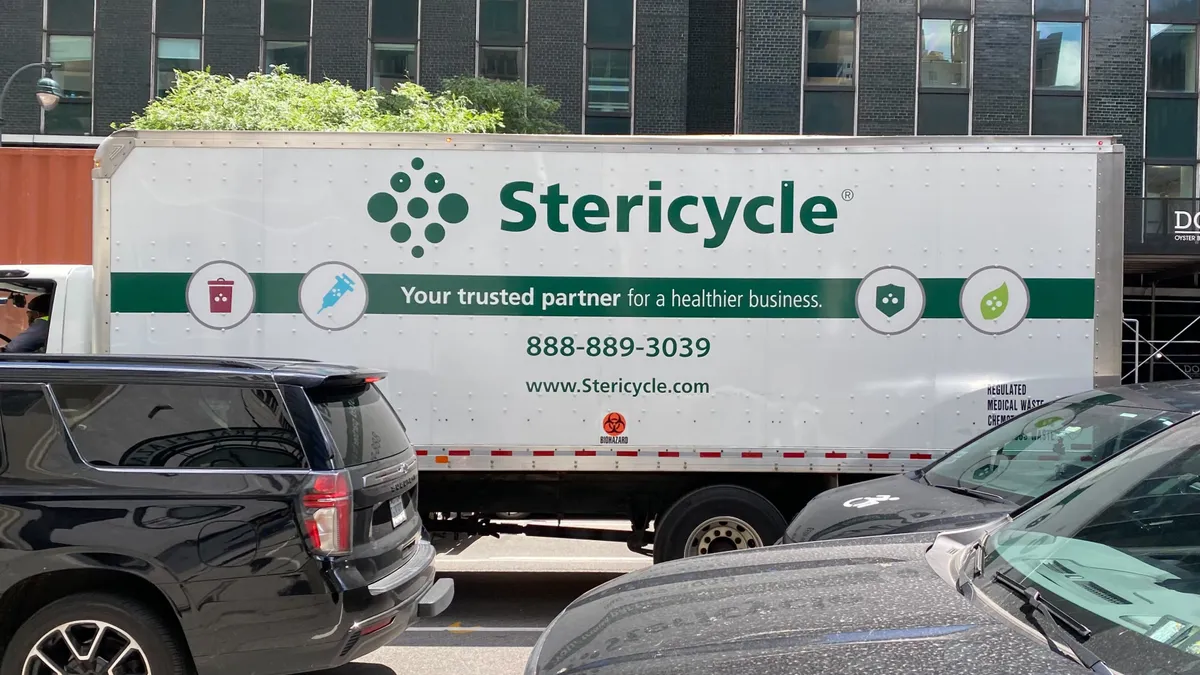Editor’s Note: Waste and recycling are inherently local issues in the United States, and we’re looking for new ways to highlight how these stories fit into broader trends. Send us your tips or feedback at waste.dive.editors@industrydive.com.
New York, other regional reopenings poised to shift commercial waste trends
Commercial waste volumes are primed for a comeback as some local leaders set official dates for rolling back coronavirus-era business restrictions and move toward full ‘reopenings.’ At least 45% of the U.S. population is now partially vaccinated against COVID-19.
Chicago Mayor Lori Lightfoot said this week the city’s goal is to reopen by July 4, while other cities like Philadelphia are yet to set specific dates. In the most populous U.S. city, Mayor Bill de Blasio last week announced a target for New York City to be fully reopened by July 1. Gov. Andrew Cuomo this week followed up with an aim to reopen New York state May 19, with neighboring New Jersey and Connecticut pushing toward a similar goal. And in Massachusetts, a full reopening is pegged for Aug. 1, although the state will loosen a number of key restrictions before then.
Major waste collectors and processors in the region, affected by depressed commercial waste volumes amid pandemic-driven shutdowns the past year, recently commented on the momentum toward reopening during quarterly earnings reports.
During Waste Management’s call last week, which preceded the New York reopening announcements, CEO Jim Fish noted remaining “softness” in New York compared to business recovery in states that reopened earlier like Texas, Florida, Arizona and Tennessee, showing room to gain with New York’s potential bounce-back. Likewise, Waste Connections CEO Worthing Jackman counted New York City as among the major metro areas that would have incremental impact for the company if they “eventually get back to reopening again.”
Casella Waste Systems’ earnings call came after de Blasio’s announcement. Chief Financial Officer Ned Coletta called the news “big.” CEO John Casella said that lower landfill tonnage in the greater New York City area continued to damper its regional disposal volumes in the first quarter. And Casella described NYC as both “one of the hardest hit areas in the country related to the pandemic and one of the slowest to reopen,” but also noted the company saw “positive volume trends over the past several weeks related to business and construction activity levels beginning to come back online in a more robust manner.”
Investment firm Jefferies has been tracking U.S. commercial waste volumes during the pandemic and believes 75% have been recovered at this point, said equity analyst Hamzah Mazari. Not only does that leave a quarter of pre-pandemic volume left to recover, but Jefferies believes that pent-up consumer demand will translate to waste volumes exceeding pre-pandemic volumes.
Personal consumption expenditures among U.S. consumers have had the highest correlation to the waste sector’s organic revenue growth, which includes both price and volume, Mazari said. “We actually think you're going to surpass pre-COVID levels pretty easily because of how strong the U.S. consumer is today,” and because of that potential spike in spending, seasonal trends could look different this year compared to other years.
How do operators prepare for a potentially speedy uptick in commercial volumes again? Waste companies largely did not have significant layoffs during the pandemic, so there aren’t necessarily huge immediate needs for hiring. But overtime labor costs could creep up, Mazari said, as could executive compensation costs as companies’ performance improves.
Steve Changaris, the Northeast vice president at the National Waste & Recycling Association, said driver shortages aren’t a big concern and members “can turn it back on pretty readily.” Some have been proactively reaching out to customers asking about reopening plans. Just because a city or state says it’s reopening does not mean private employers will follow suit, he noted. “Getting those buildings back up to 100% occupancy is not happening overnight."
More updates from around the country:
-
New York’s Department of Sanitation debuted its first all-electric street sweeper in Brooklyn, estimating the unit will save 89 metric tons of carbon emissions over its lifetime. The agency currently operates 27 hybrid electric units and 450 diesel-powered sweepers.
-
Minnesota’s Hennepin County Board of Commissioners approved a new climate action plan with multiple waste targets this week. In addition to an existing goal of 75% recycling and zero waste to landfills by 2030, the plan also calls for a food waste prevention campaign by 2022 and a 75% reuse or recycling rate for C&D. (CCX Media)
-
Boise, Idaho, is looking to expand its composting facility to increase processing capacity by 14,000 tons per year, following a 97% participation rate in its residential organics collection program. (BoiseDev)
-
Crews with Mobile, Alabama’s Public Services Department are working long hours and extra shifts to keep up on waste collection, due in part to fleet maintenance issues and global truck procurement challenges. (FOX10 News)
-
The Florida Legislature recently passed a bill that aims to limit “displacement” of private haulers in counties looking to convert to franchise systems. The bill also directs the state’s Department of Environmental Protection to revisit a 2010 report on plastics policy, as local ordinances are also preempted in the state. (Waste Dive)
-
Local governments in West Virginia expect to receive notable state funding increases for recycling and litter control thanks to a new law. The Berkeley County Solid Waste Authority, set to receive upward of $120,000 per year, called it a “significant step forward.” (Herald-Mail)
-
The Los Angeles County Board of Supervisors took a step toward limiting single-use plastics in county facilities this week, following a number of other related policy discussions in the state including bans on polystyrene foam containers in Palm Springs and Sonoma, and Pasadena’s consideration of a takeout foodware opt-in ordinance.
-
The Pittsburgh City Council is weighing a resolution to ban single-use plastic bags, even though a temporary state preemption law remains in effect. The city may join Philadelphia’s legal efforts to overturn that policy. (TribLIVE)
Action continues on building deconstruction, material reuse
A report on material reuse and building deconstruction prepared recently for San Antonio highlighted the city’s opportunities to reduce environmental and economic costs by bolstering its material recovery infrastructure.
San Antonio is one of a handful of major cities in recent years that have taken steps to salvage materials from old structures to advance multiple goals, including diverting waste from disposal, being more thoughtful in the demolition decision process, creating new jobs and teaching skills, and moving toward a more circular economy.
Some recommendations in the report by historic preservation firm PlaceEconomics included giving grants for deconstruction, raising demolition permit fees, implementing C&D tipping fee surcharges and funding the creation of a community salvage app.
More broadly, Alyssa Frystak, director of research and data analytics at PlaceEconomics, said her firm has surveyed people in the historical preservation community and found mounting support for the deconstruction route when not every building can be saved, and a realization that the practice can more closely align the preservation movement with the sustainability movement.
As far as extending those findings to other cities, authors at PlaceEconomics believe that as regions emerge from the coronavirus crisis, the job creation and training aspect may be the most persuasive.
At Urban Ore, a Berkeley, California-based salvage business featured in the report, strong demand has continued to support jobs. Although not building-specific, the business has more than 30 employees and is on track to do $3 million in revenue this year, said CEO Dan Knapp. Last year marked its best year of sales. And notably, after many years of operating in the city, as of 2020 UrbanOre is paid a salvage service fee of $47.74 per ton by the city, which is equal to what Waste Management is paid to landfill materials, per the report.
“I think anybody that gets into this now is catching a rising wave,” Knapp said.
Within the past month, signals of momentum for recovering materials from buildings across the U.S. include Pittsburgh’s move to have more buildings in the city deconstructed rather than demolished, and Boise’s step to slow the demolition permitting process.




















